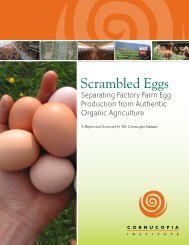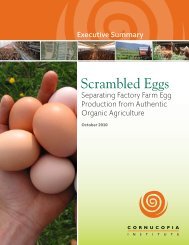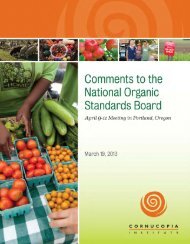“Behind the Bean” (pdf) - Cornucopia Institute
“Behind the Bean” (pdf) - Cornucopia Institute
“Behind the Bean” (pdf) - Cornucopia Institute
You also want an ePaper? Increase the reach of your titles
YUMPU automatically turns print PDFs into web optimized ePapers that Google loves.
Commitment to Organics<br />
If we continue our offenses against <strong>the</strong> land and <strong>the</strong> labor by which we are fed, <strong>the</strong> food supply will decline, and<br />
we will have a problem far more complex than <strong>the</strong> failure of our paper economy. The government will bring forth<br />
no food by providing hundreds of billons of dollars to <strong>the</strong> agribusiness corporations. 9<br />
—Wendell Berry and Wes Jackson, from an op-ed piece in <strong>the</strong> New York Times, January 2009<br />
A De a d Zo n e in t h e Gu l f o f Me x i c o <strong>the</strong> size of<br />
New Jersey, 10 thousands of cases of acute pesticide<br />
poisoning among farmers and farmworkers, 11 polluted<br />
water from animal agriculture that kills millions<br />
of fish 12 —<strong>the</strong>se are just a few examples of <strong>the</strong><br />
“offenses against <strong>the</strong> land and labor” that Wendell<br />
Berry, a farmer and agrarian poet and writer, and<br />
Wes Jackson, president of The Land <strong>Institute</strong> in<br />
Kansas, are talking about. But Berry and Jackson<br />
are also talking about something more serious than<br />
<strong>the</strong>se high costs. They are taking a lesson from history:<br />
societies that ignore <strong>the</strong> health of <strong>the</strong> land<br />
and soil that grows <strong>the</strong>ir food are doomed to fail.<br />
If we want our children and grandchildren to eat<br />
tomorrow, we must care for <strong>the</strong> land today.<br />
Photo courtesy of Vermont Soy, Louis Rainville.<br />
If we wish to see more farmers<br />
caring for <strong>the</strong> land in thoughtful<br />
ways, as opposed to relying heavily<br />
on petroleum-based fertilizers and<br />
toxic pesticides, consumers must<br />
support organic farmers by buying<br />
<strong>the</strong> foods <strong>the</strong>y produce and paying<br />
<strong>the</strong>m a fair price for it.<br />
Increasingly, governments, scientists, and organizations are<br />
coming to <strong>the</strong> same conclusions. In 2008, an intergovernmental<br />
panel, supported by organizations such as <strong>the</strong> World<br />
Bank and <strong>the</strong> United Nations, reported that organic management<br />
of food production is <strong>the</strong> most sustainable way to<br />
feed <strong>the</strong> world. 13 Organic farming combines old wisdom with<br />
modern knowledge of pest control, nutrient cycling, crop<br />
synergies, and soil health. Scientists and researchers are continually<br />
discovering additional benefits of growing food under<br />
organic management, while dispelling <strong>the</strong> myth that organic<br />
farming systems are less productive than intensive conventional<br />
systems.<br />
If farmers do not care for <strong>the</strong> land, we risk losing <strong>the</strong> resources<br />
on which our food production depends. Organic agriculture<br />
aims to build <strong>the</strong> health of <strong>the</strong> soil, and to raise its productivity<br />
through means that are less dependent on fossil-fuel<br />
energy. Organic agriculture, <strong>the</strong>refore, is more than a system<br />
of “withouts”—without growth hormones, without syn<strong>the</strong>tic<br />
fertilizers, without toxic pesticides, and so on. It is about<br />
building a healthy and sustainable food production system.<br />
In 1995, <strong>the</strong> National Organic Standards Board defined <strong>the</strong><br />
principal guidelines for organic production as <strong>the</strong> use of “ma-<br />
10 Behind <strong>the</strong> bean: The Heroes and Charlatans of <strong>the</strong> Natural and Organic Soy Foods Industry.





